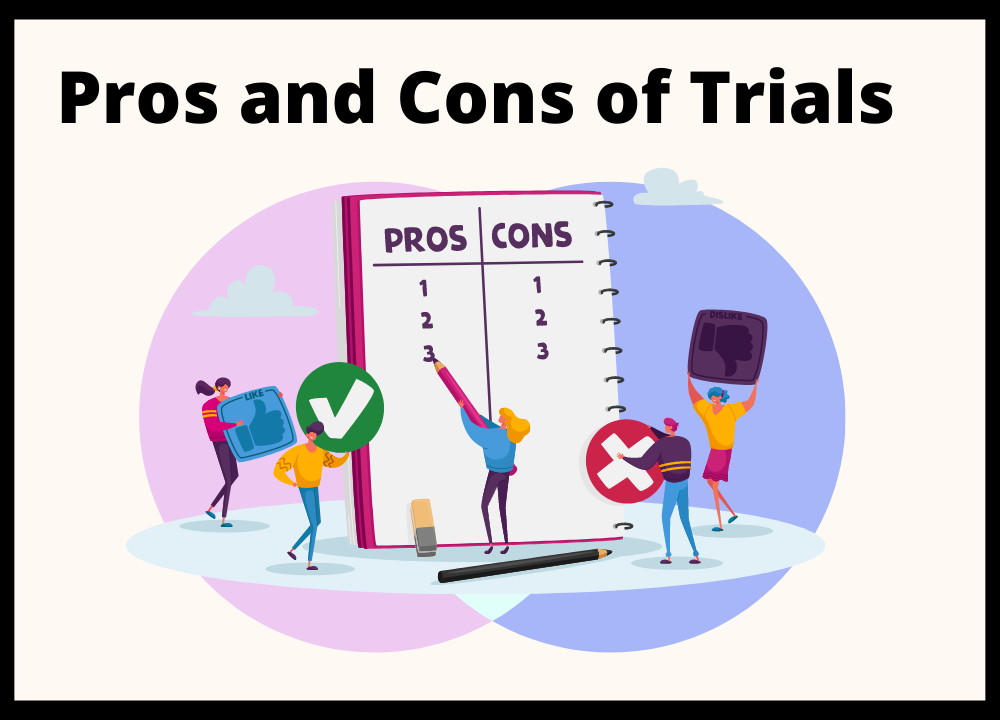
Offering trials for online courses can be a win-win situation for both you and your clients. You can enhance the base of your potential customers and they can get a feel of what value you are actually offering. There are usually two types of trials.
Limited-time Trial: In this type, you offer whole content for a limited period like 15 days or 30 days.
Limited-content Trial: Here, you limit the content and make a small part available for a trial. So, it may hook the clients and they might upgrade to the whole package.
Paid Trials: Some businesses charge a nominal fee for the trial like $1. Some also offer the trial with a full fee but a money-back guarantee if the customer does not like it.
Table of Contents
TogglePros and Cons of Offering Trials for Online Courses:
However, offering trials of online courses have their advantages and disadvantages. If you are puzzled about offering it to your visitors, give a quick look at the pros and cons of trials. It might help you acknowledge whether it is good for your business or not and make the final decision.
Pros of Offering Trials for Online Courses

Trials are a popular selling strategy even with physical products. Just like, when people can get small testers of an expensive perfume or beauty product to check if they want to buy the product or not. These testers can be free or they can be purchased at a lower price. The same is the case with non-physical products like memberships, courses, software, plugins etc. Here are a few pros of offering trials.
1. Introducing your Product:
Trials are a great way to introduce your product. You may have constructed an amazing ad and marketing strategy, but offering the trial gives a taste of the actual product. People can test your product themselves and make the decision.
If offering free trials is a trend in your industry, then not offering one can be a disadvantage for you. If your competitors are not offering any trials, then it can give you a competitive edge. In both ways, trials provide clarity about the product and remove any doubts.
2. People Invest Time in the Product
Even if people are not paying a penny to get your trial, still they are spending their time. If a person is spending enough time to understand your offer, he is pretty much interested in it.
It is also suggested to ask the clients to set up a free account. They took enough time to set up an account, they are likely to stay after the trial period ends.
Not only will they see how your course or membership is helping them practically, but they have also invested enough time setting up accounts, putting images and probably connecting with other people, there is a higher chance that they will not replicate everything elsewhere.
3. Collecting Feedback
Offering trials for online courses can be beneficial as people who have used the trial can give you thoughtful insights about the product. If they do not buy the whole package, you can ask them for feedback. It is just like a customer survey and you can apply the suggestions to improve your offering.
Probably one client really liked the product, but he thought the price was much higher so you can offer some discount. Feedbacks are also a great way to improve customer service and content creation.
4. Attracting Interested Clients by Offering Incentives
Once someone has signed up for your trial period, keep reminding him of the time left. Just when the trial is about to end and still he has not bought the whole product, you can engage him by presenting some trailers only discount.
Some businesses create a sense of urgency by offering the discount only for a limited period, let’s say for 2 days after which the offer will expire. If the person is really interested, he will take advantage of the incentive for sure.
5. Reduce the Need for Aggressive Selling
A great product sells itself. If your product is really awesome and people have themselves tested it, it is marketing itself. If they are actually gaining benefits from your product, they will convert from testers to actual customers.
Offering trials for online courses can also reduce the marketing efforts by creating a positive word of mouth, resulting in more sign-ups. You can also offer a referral discount which will tempt the tester to not only buy the product but also bring another on your way.
6. Guaranteed Customer Satisfaction
Customer satisfaction is everything. If your tester is really satisfied with the trial, he will not only become a paying customer but also promote your product by recommending it to others.
Similarly, if you are not offering any trials, your customer retention can be low. People will leave your offering even after paying the whole amount. But, when they pay after testing, it surely means they are satisfied with your product and they are going to stay.
7. Builds your Email list
A lead who participates in your free trial is the one who has taken the time to set up the profile and doing all the stuff. So, it is more likely to stay for a longer time. It helps to build your email list and you can communicate with them.
8. Clears Doubts of Customers
Trials remove any unrealistic expectations and clear the whole picture. Your potential customers can explore on their own. It removes the burden of the selling team to answer product-related queries so they have more time to focus on generating more leads.
Cons of Offering Trials of an Online Course

There are endless advantages of using a trial period but every rose has thorns. It also has some cons which are discussed below.
1. Money and Time Costs
You are offering your product or a part of your valuable content for free which will cost you the monetary cost. You will also need to spend time carefully crafting and choosing content for the trial, how long you want your trial to be, features included, sign up process and then marketing the trial.
You have to make everything simple and user friendly for the people to convert from the testing phase to paying phase. It is not only about affording the whole process but also considering those people who will just take advantage of your content without any intention of actually subscribing.
This is the reason many businesses offer a trial at a discounted rate, rather than being absolutely free. These people provide payment information and personal data, so any scammer does not try to indulge in this fatigue.
2. Data leakage
Most people are more concerned due to any data leakage. It takes a lot of time and effort to build up the whole package whether it is a membership or just a course.
So, they are concerned about the people who are there just to download your content logging in from multiple accounts and “stealing” worthy material with zero intention of ever signing up. Moreover, there is competitor snooping, where potential competitors might be signing up for the trial period just to take a look at your content.
Ultimately, if one has the intention of just getting their hands on the content, they will do it anyway. They can just cram all the material in 14 or 30 days and then cancel their subscription as well. Again these people do not usually go for giving their payment information, so you can ask them for a nominal amount even if it is $1.
In this way, you can minimize the risk of getting all the content stolen if you decide to offer a trial for your course or membership.
3. Lack of Courage
This is something related to your own thought process. If many people are leaving out after using the trial and do not subscribe for a full version of your LMS, you might get discouraged and lose your heart. This is normal, we all go through this.
Try getting feedback from the trial sign-ups and see if there is an issue on your side or if you might not be targeting the right people. They will give you thoughtful insights about the whole process, which will help you to improve it. Otherwise, they might be just tenantless ones, hanging around for free content.
Strategies to Minimize the Risk of Trial
Until now, you have become quite familiar with the pros and cons of offering trials for online courses or membership models. Here are a few strategies to minimize the risks associated with the trials.
- Setting up a free account: Even if you are offering a free trial, ask the people to sign up for a free account. Only those who are really interested will put some time and effort into signing up, providing email addresses, and uploading pictures.
- Ask for billing information: This strategy is used by many businesses. Rather than offering a completely free trial, they offer paid trials.
- Either the trial subscriber has to pay the full amount with a money-back guarantee in case he is not satisfied. Or the subscriber has to pay a nominal amount, just a few dollars or even $1. Only those who are really interested will do that much effort to actually provide all the billing information and then sign up for the trial.
- Collecting feedback: This is as important as doing customer surveys and identifying potential customers. Ask for feedback from all of the testers. They will provide their experience and useful information for further improvements.
- Drip feed method: This method is mostly used by course providers. They offer limited content in their trial and the lead has to pay the full amount to get access to the full course. You can also use this method with membership, excluding premium services from the trial period.
- Premium Content: We suggest including something premium which you will be offering just to your permanent subscribers. Also, add something which builds a direct relationship with the customers like webinars or personal emails which can not be stolen anyway
- Restrict downloads: Some businesses use a special code or software like CurrentWare to restrict mass download attempts to protect their content. It also prevents scammers from downloading multiple files.
Have you ever offered a free trial to your clients? What were the pros and cons of doing this? Tell us about your experience. If you want more information on the pricing strategy of online courses, check our blog here.










